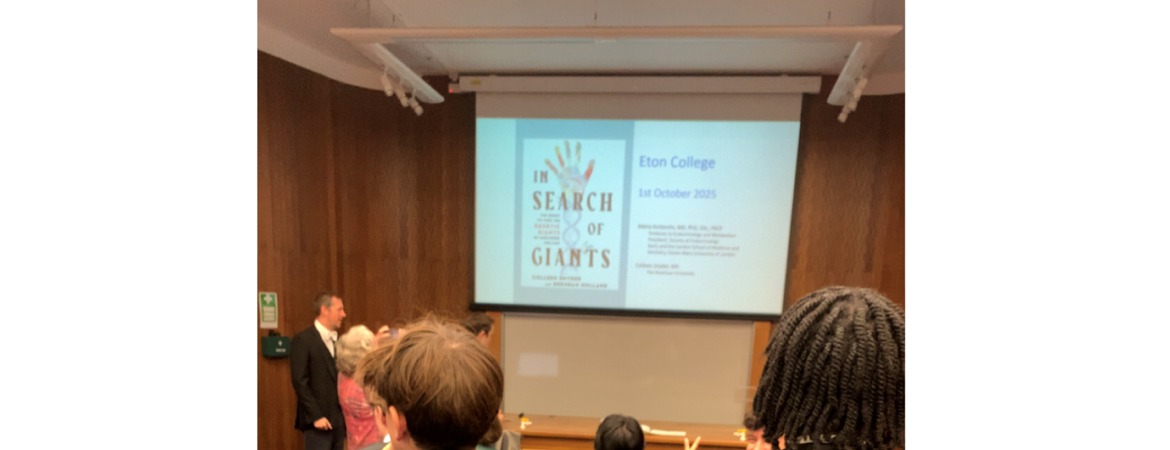- Home
- School Life
- News
- Med Soc students attend talk at Eton College
Med Soc students attend talk at Eton College

This week, Eton College Med Soc invited our aspiring Medics to attend an evening lecture featuring Professor Korbonits. As a Professor of Endocrinology her talk discussed cutting-edge research into the genetic cause of disease.
Isabella - a Year 13 student - attended the lecture and has written a fantastic report about the event:
Whether David won against Goliath with a single stone remains up for debate, but what can be proven is that Irish giants did walk this earth. This was not due to a curse, but rather pituitary gigantism, also known as acromegaly - a condition caused by a tumour in the pituitary gland, which, amongst other things, secretes excess growth hormone.
On Tuesday evening, some of my peers and I attended a genetics and endocrinology lecture at Eton College, where we heard from Professor Márta Korbonits, a leading scientist in the field of pituitary tumorigenesis and endocrine genetics.
Throughout the lecture, we learnt about Professor Korbonits and her colleagues’ research into the genetic cause of this disease. They identified the R304X mutation in the AIP gene, a change in the nucleotide sequence (CGA → TGA) that introduces a premature stop codon, resulting in a truncated, non-functional AIP protein.
Beyond the scientific background, we were guided through a genetic puzzle: the heritage of her four families of patients can be traced back to a very close region in Northern Ireland. Through genotyping, haplotype analysis, and mathematical modelling, her team traced the mutation back to its origin approximately 2,500 years ago - over 100 generations.
Later, we also heard from Colleen Snyder, co-author of In Search of Giants and the first identified case of this disease in the United States. She shared her personal journey, describing the challenges she faced both before and after her diagnosis. The disease affects more than height: symptoms can include splitting headaches, joint pain, psychological strain, vision loss, and diabetes. Her story was deeply moving, especially when she recounted the relief she felt upon meeting Brendan Holland, another patient with the same disease, 45 years after her own diagnosis.
This leads to the question: what can be done about this disease?
Professor Korbonits is particularly focused on the proactive recognition of acromegaly for affected individuals, especially those with Northern Irish heritage, who may unknowingly carry the mutation. Awareness and genetic screening allow families to monitor children closely, ensuring that any tumours are caught early and managed effectively.
For us students, it was inspiring to meet a leading expert in the field and see how work in the lab translates directly into real-world outcomes. The lecture gave us a clear sense of how research, combined with patient care, can make a tangible difference in people’s lives and those of future generations. The talk left many of us wondering what the future might hold: could early detection, new treatments, or even gene-editing one day prevent these conditions?
This opportunity is just one example of how our Sixth Form supports students at every stage as they prepare for life post-18.
If you know someone in Year 11 who is looking for a supportive and inspiring place to continue their studies post-16, we’d love to welcome you to our Sixth Form Open Evening on Thursday 16th October. It’s a great chance to explore our courses, meet subject specialists, and discover how we help students thrive.

